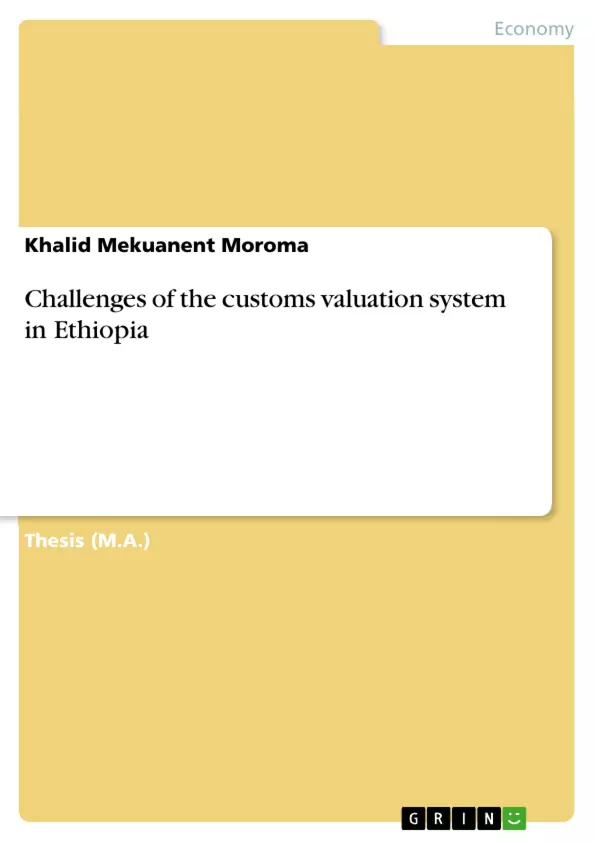The general objective of this work is to assess the factors that affect Ethiopian importers during customs valuation. The work was conducted to assess the practices and challenges of customs valuation. In particular, the work attempted to achieve the following specific research objectives: The author seeks to explain practices of custom valuation, identify the major factors that affect importers during the procedures of customs valuation, analyse and describe challenges in customs assessment processes and discover the customs operational problems in Ethiopia, in order to identify inspection or physical examination problems during the custom valuation process while enhancing the objective of trade control.
Indirect taxes contribute the significant portion of tax revenues in developing countries in general and Ethiopia in particular. Custom duties and import taxes are among the important indirect taxes levied on imported commodities in Ethiopia. Despite the fact that foreign trade taxes and duties provide significant revenues to Ethiopia, there is a serious and complex problem of invoicing of import values by importers. Duties and taxes escape the net resulting in gross economic distortions such as uneven playing field and unfair competition for legal traders. Such circumstances also result in loss of revenues to government.
Inhaltsverzeichnis (Table of Contents)
- Chapter One
- Introduction
- Background of the study
- Statement of the Problem
- Objective of the study
- General Objective
- Specific Objectives
- Scope of the study
- Methodology
- SIGNIFICANCE OF THE STUDY
- Chapter Two
- Literature Review
- Theoretical review
- Empirical review
- Literature Review
- Chapter Three
- Discussion and analysis
- Customs valuation rules in Ethiopia
- Customs declaration procedures
- Customs valuation and duty assessment
- Customs valuation process
- Customs valuation systems control mechanisms
- Customs operational challenges
- Discussion and analysis
- Chapter Four
- Conclusion and Recommendation
- Conclusions
- Recommendations
- Conclusion and Recommendation
Zielsetzung und Themenschwerpunkte (Objectives and Key Themes)
This research study aims to evaluate the factors influencing Ethiopian importers during customs valuation processes. The study seeks to explore the practices and challenges associated with customs valuation in Ethiopia, focusing on the Kality branch of the Ethiopian Ministry of Revenues (MOR).
- Customs valuation practices in Ethiopia
- Factors affecting importers during customs valuation
- Challenges in customs assessment processes
- Customs operational problems in Ethiopia
- Inspection and physical examination problems during customs valuation
Zusammenfassung der Kapitel (Chapter Summaries)
Chapter One provides an introduction to the topic of customs valuation, outlining its importance and significance in international trade. It also lays out the research problem, objectives, scope, methodology, and significance of the study.
Chapter Two reviews the existing literature on customs valuation, covering both theoretical and empirical studies. The chapter explores international valuation standards, the Agreement on Customs Valuation, and various methods of determining customs value. It also discusses the challenges related to customs valuation, particularly in the context of related parties' transactions.
Chapter Three delves into the analysis of customs valuation rules, declaration procedures, and duty assessment practices in Ethiopia. It examines the customs valuation process and control mechanisms implemented by the Ethiopian Ministry of Revenues. The chapter also explores operational challenges encountered in the customs valuation system.
Schlüsselwörter (Keywords)
This research focuses on the customs valuation practices, challenges, and operational issues faced by Ethiopian importers. It specifically examines the role of the Ethiopian Ministry of Revenues (MOR) and the impact of international valuation standards and agreements. The study aims to provide insights into the complexities of customs valuation in a developing country context, highlighting factors such as under-invoicing, related parties' transactions, and trade control mechanisms.
- Quote paper
- Khalid Mekuanent Moroma (Author), 2019, Challenges of the customs valuation system in Ethiopia, Munich, GRIN Verlag, https://www.grin.com/document/508156



